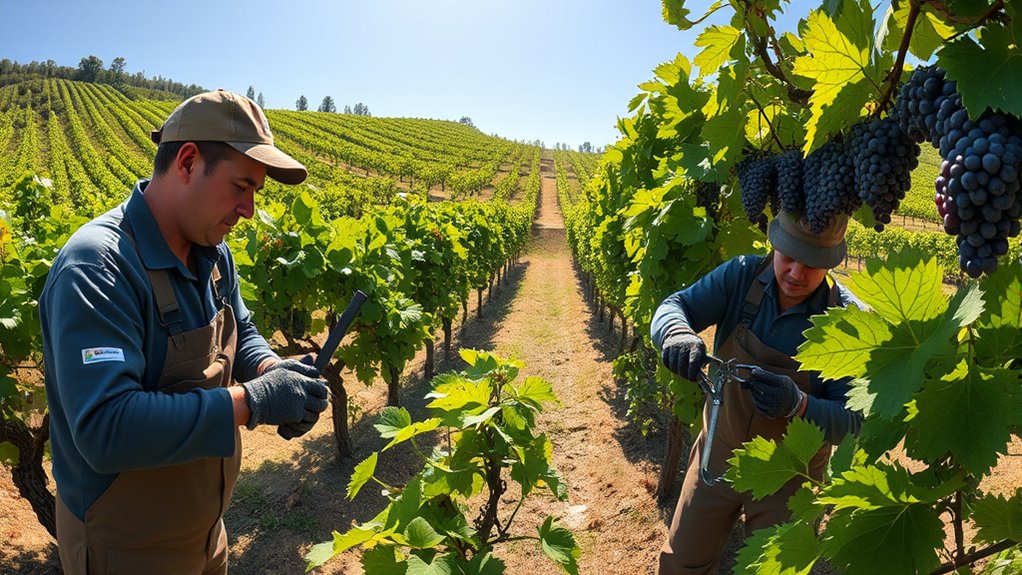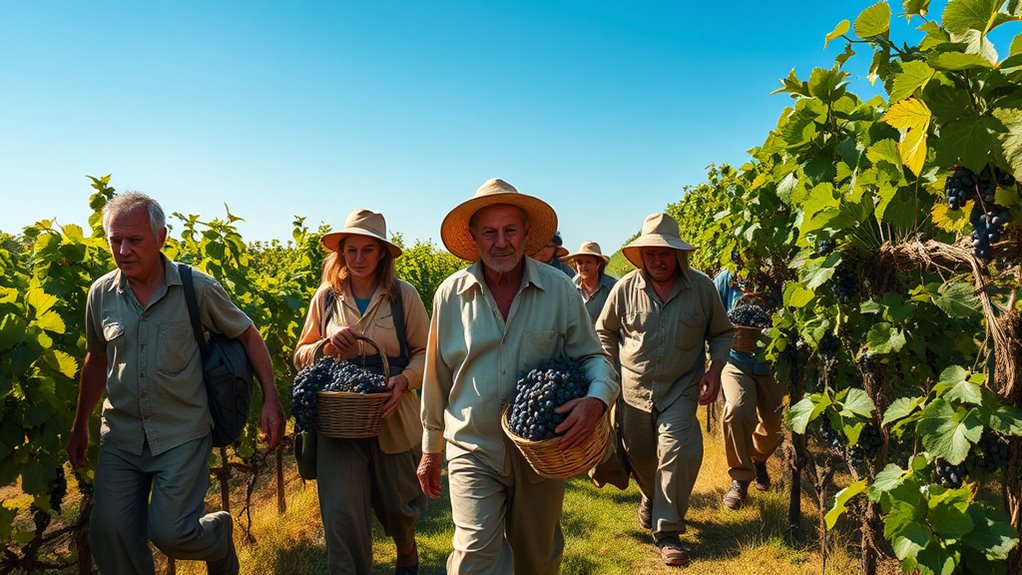Workers in the vineyard remind us of the importance of fairness, mercy, and recognition in labor. Historically, vineyard workers faced tough conditions, but reforms and ethical practices now promote fair wages, respect, and support. These lessons highlight that valuing everyone’s contribution fosters trust, motivation, and sustainability. Embracing these principles helps create better workplaces and communities. To understand more about how these lessons apply today, keep exploring how vineyard stories shape work ethics and fairness.
Key Takeaways
- Vineyard workers historically faced long hours, low security, and exploitation, prompting labor reforms and union efforts.
- The parable emphasizes divine fairness and mercy, illustrating that grace is freely given beyond human expectations.
- Modern ethics in vineyards promote fair wages, respectful treatment, and inclusive decision-making to foster trust and motivation.
- Agricultural workers often encounter health risks from pesticides, job insecurity, and physically demanding tasks, highlighting ongoing challenges.
- Recognizing workers’ contributions encourages respect, teamwork, and improved productivity within vineyard communities.
Historical Perspectives on Vineyard Labor

Have you ever wondered how vineyard labor has evolved over centuries? Early on, workers faced long hours and little job security, prompting the rise of labor unionism to fight for fair wages and better conditions. Over time, vineyards recognized that sustainable crop production depended on treating workers fairly, leading to reforms that prioritized crop sustainability and worker well-being. As unions gained strength, labor rights became central to vineyard operations, ensuring consistent practices that support both workers and the health of the vines. This historical shift reflects a move toward more ethical labor practices, emphasizing the importance of collaboration between vineyard owners and workers to achieve long-term productivity and sustainability. Understanding this evolution highlights the ongoing importance of fair labor standards in vineyard history.
The Parable of the Workers in the Vineyard

The Parable of the Workers in the Vineyard offers a powerful lesson on fairness and divine generosity. In vineyard traditions, labor disputes often arose over pay and treatment, reflecting human struggles with justice. This parable challenges those notions by illustrating that the landowner’s generosity isn’t based on fairness but on mercy. You see, some workers start early, while others arrive late, yet everyone receives the same wage. This highlights that God’s grace isn’t earned or proportional but freely given. As you reflect on this, you realize that divine fairness often defies human expectations, emphasizing compassion over strict justice. The story reminds you that God’s generosity surpasses our understanding, encouraging humility and trust in His boundless mercy.
Modern Applications of Vineyard Work Ethics

The principles of fairness and mercy from the Parable of the Workers in the Vineyard still resonate today, especially in how modern workplaces approach ethics and treatment. You see this in harvest teamwork, where everyone’s contribution is valued regardless of role or experience. Vineyard leadership now emphasizes equitable treatment, fostering trust and motivation among workers. Ethical practices include recognizing individual efforts, ensuring fair compensation, and promoting a culture of respect. These values help create a positive environment that encourages collaboration and loyalty. By applying the core lessons from the parable, you can inspire a workplace where fairness guides decisions and mercy shapes interactions. This approach not only benefits workers but also strengthens the overall health and productivity of your organization.
Challenges Faced by Workers in Agricultural Settings

Workers in agricultural settings often face numerous challenges that can impact their well-being and productivity. Pesticide exposure is a significant concern, risking health issues from prolonged contact with harmful chemicals. Many workers lack proper protective gear or training, increasing their vulnerability. Seasonal employment also creates instability, as workers often face unpredictable job security and inconsistent income. This variability can lead to financial stress and limited access to healthcare or benefits. Additionally, long hours and physically demanding tasks strain your body, while language barriers or limited legal protections can leave you vulnerable to exploitation. These challenges highlight the importance of improved safety measures, fair employment practices, and support systems to protect your health and ensure stable livelihoods in the agricultural sector.
Recognizing the Value of Every Contributor

Recognizing the value of every contributor is essential for building a fair and thriving agricultural community. When you appreciate each person’s role, from skilled workers to newcomers, you foster respect and teamwork. This acknowledgment impacts vineyard management and harvesting techniques by encouraging knowledge sharing and innovation.
You can:
- Celebrate diverse harvesting techniques that improve yield and quality
- Value experience in vineyard management to motivate staff
- Recognize small contributions that enhance overall productivity
- Promote inclusive decision-making to strengthen community bonds
Lessons on Fairness and Equality From Vineyard Stories

The vineyard stories highlight that fairness isn’t always about equal pay for everyone, but about justice in how work is shared. You might wonder how to balance rewards when some contribute more than others. These stories challenge you to contemplate what true fairness and equality look like in the workplace.
Equal Pay for All
Have you ever wondered what fairness truly means in the workplace? It’s about ensuring everyone’s labor rights are respected, regardless of their role or hours worked. The story of vineyard workers highlights the importance of equal pay for all, challenging wage disparities that often favor the early or more visible workers. When everyone receives fair compensation, it promotes a sense of justice and unity among workers.
Consider these key points:
- Recognizing the value of every worker’s contribution
- Addressing wage disparities that create inequality
- Upholding labor rights through fair pay policies
- Building trust and morale in the workforce
Justice in Worksharing
Lessons on fairness and equality from vineyard stories show that sharing work equitably benefits everyone. When you address wage disparity, you reinforce labor rights and promote justice. In many stories, workers who start early or work longer hours often receive the same pay as those who arrive later, highlighting unfairness. Equal treatment isn’t just about wages; it’s about respecting each worker’s dignity and effort. If you focus on justice in worksharing, you ensure that everyone feels valued and fairly compensated. This approach reduces resentment and fosters unity. Upholding labor rights means recognizing each person’s contribution, regardless of their role or start time. By practicing fairness, you create a more just work environment where everyone’s rights are protected and honored.
Frequently Asked Questions
How Do Vineyard Workers’ Pay Scales Vary Across Different Regions?
Regional wage disparities and seasonal pay differences markedly impact how pay scales vary across regions. You’ll find that in areas with higher living costs, wages tend to be higher to attract workers. Conversely, regions with seasonal agriculture may offer lower base pay but include bonuses or overtime during peak times. These variations reflect local economic factors and labor demand, making pay scales inconsistent across different regions.
What Legal Rights Do Vineyard Workers Have Regarding Working Hours?
You have legal rights regarding working hours that protect you under employment contracts and worker protections. These laws typically limit the maximum hours you can work per day or week and may require overtime pay for extra hours. Employers must adhere to these regulations, ensuring you’re not overworked and that your rights are respected. If your employer violates these rules, you can seek help from labor authorities or worker rights organizations.
How Has Technology Impacted Vineyard Labor Practices Over Time?
Imagine a vineyard where automated harvesting machines glide through rows like clockwork, transforming labor practices. You see drones surveilling fields, ensuring efficiency and safety. Technology has reshaped vineyard work by streamlining tasks, reducing manual labor, and improving monitoring. These innovations, like automated harvesting and drone surveillance, make work more precise and less physically demanding, changing how vineyard workers operate and adapt to new tools over time.
What Are the Health and Safety Standards for Vineyard Workers Today?
Today, health and safety standards focus on harvest safety and pesticide protocols. You’re expected to wear protective gear during pesticide application and follow strict guidelines to minimize exposure. Regular training ensures you understand proper handling and emergency procedures. These standards aim to reduce risks, promote safe working environments, and protect your health. Staying informed and compliant helps you work safely and effectively while maintaining vineyard productivity and safety.
How Do Vineyard Workers Organize or Advocate for Better Working Conditions?
You can organize or advocate for better working conditions through worker unionization, which gives you collective bargaining power. Participating in advocacy campaigns helps raise awareness and pressure employers to improve safety standards and wages. By uniting with colleagues and engaging in these efforts, you actively push for positive change, ensuring your rights are protected and your working environment becomes safer and more equitable. Your voice truly makes a difference.
Conclusion
Just like the vineyard workers, your efforts matter regardless of when you start. Imagine a modern farm where all workers, from seasoned veterans to new hires, are paid fairly and treated with respect. When you embrace fairness and recognize everyone’s contribution, you foster a more just and compassionate community. Remember, every worker’s role is essential—your actions can help create a workplace where everyone feels valued and appreciated.










